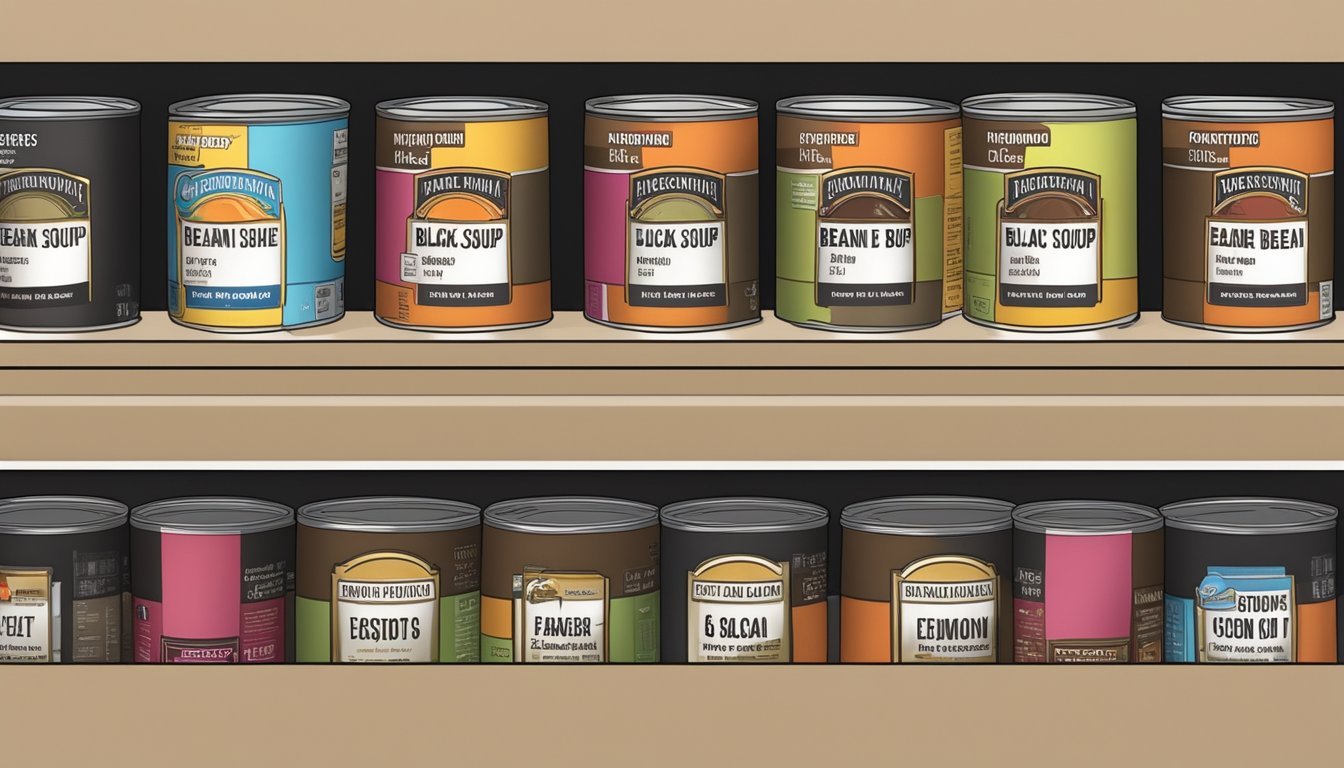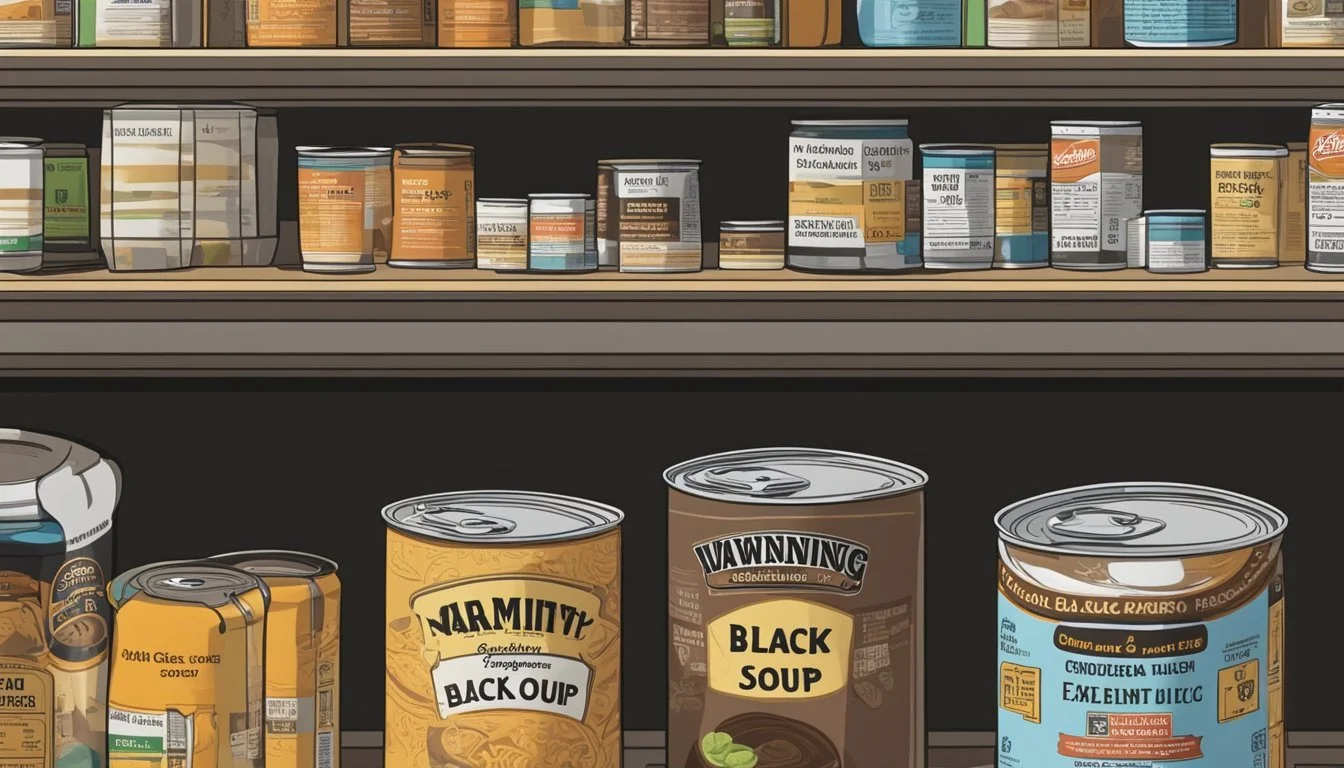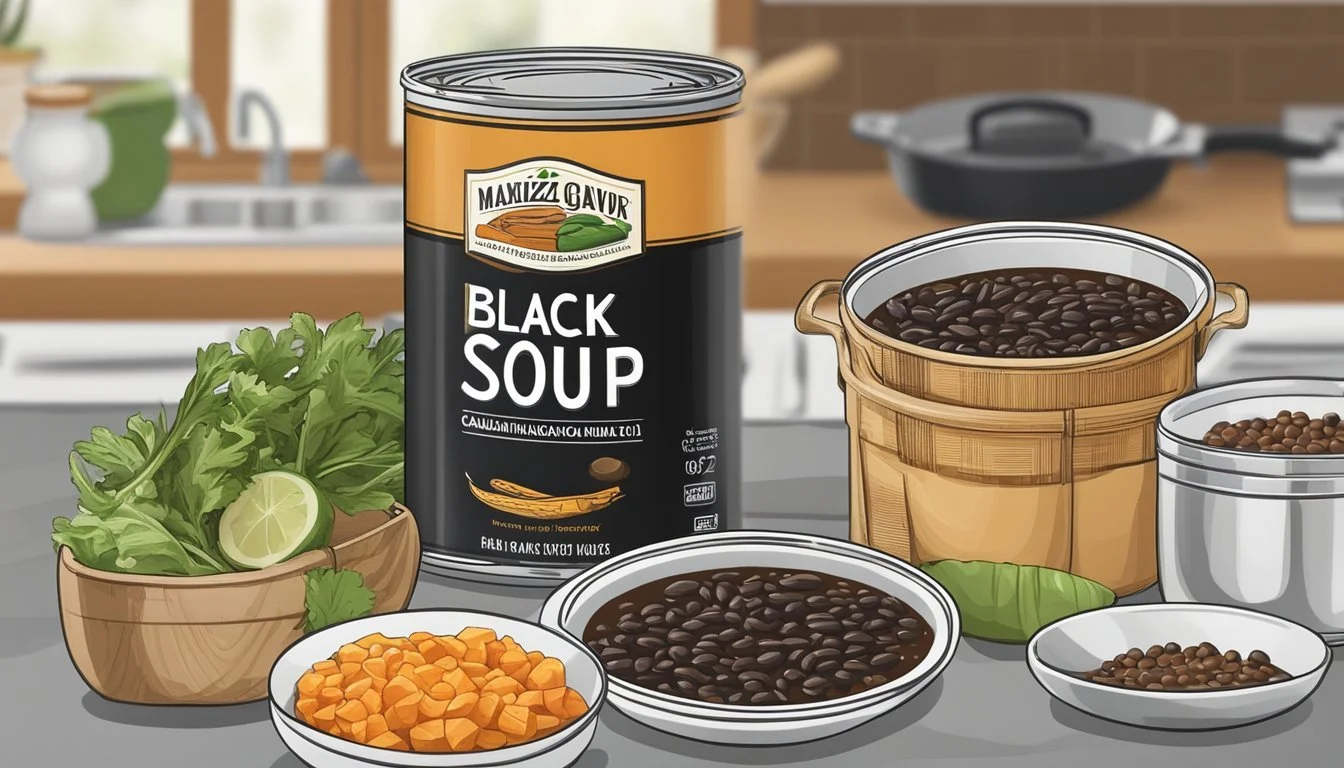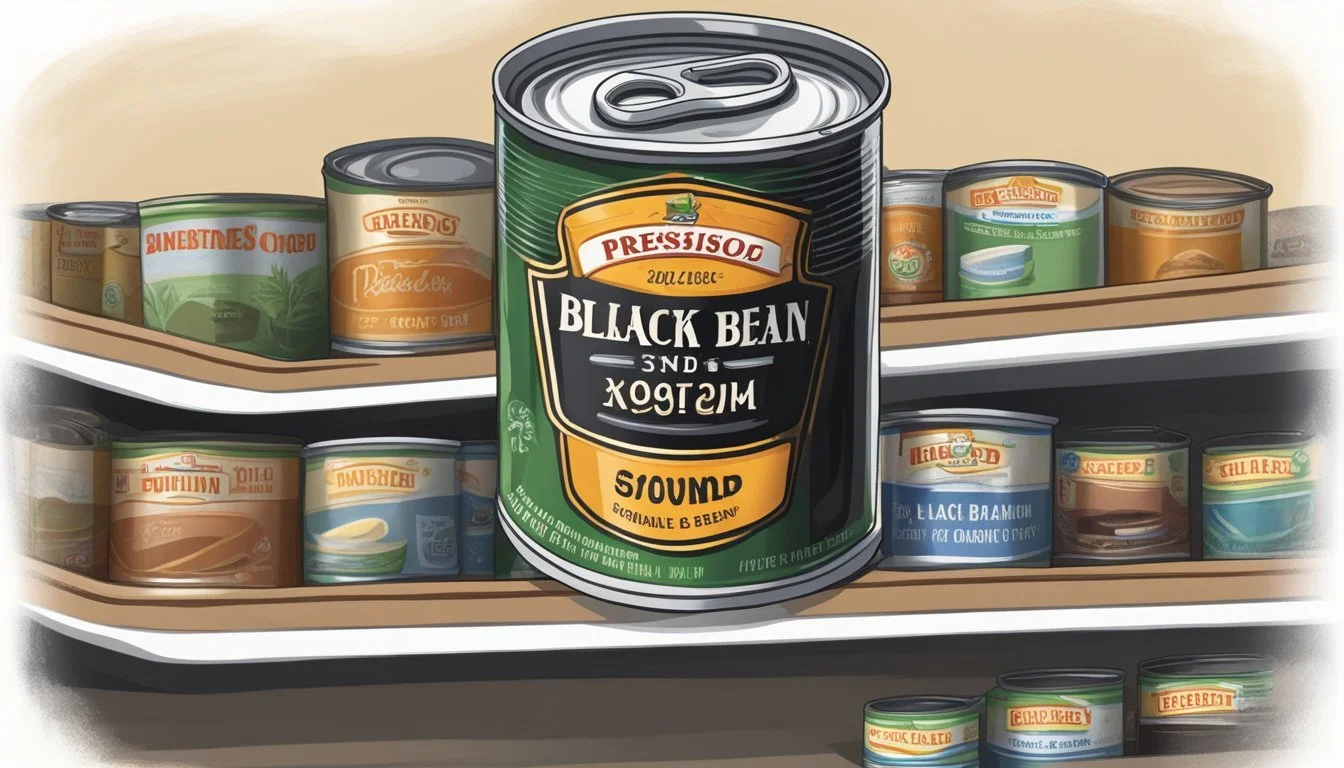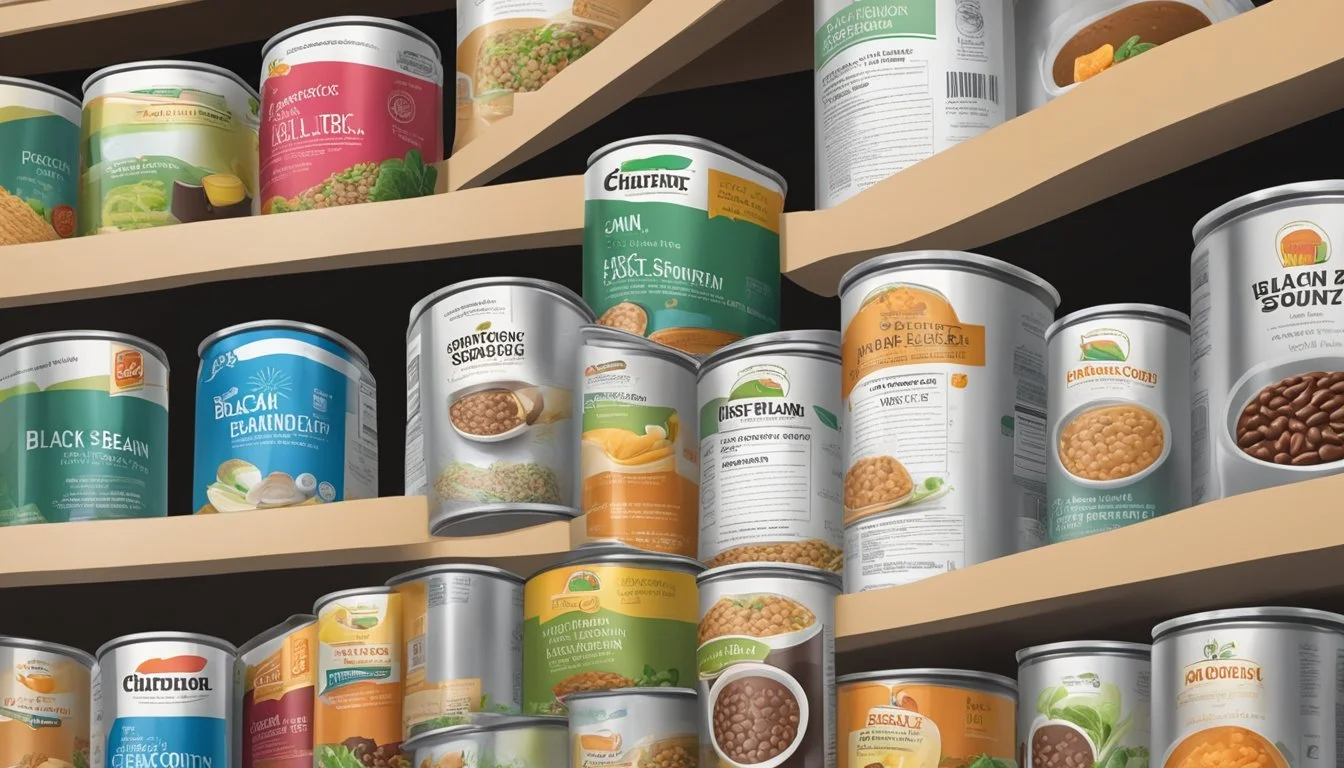Does Canned Black Bean Soup Go Bad?
Understanding Shelf Life and Spoilage
Canned black bean soup is a pantry staple, appreciated for its convenience and long shelf life. Unopened, this soup can maintain its quality for up to 2-3 years when stored under proper conditions. Even beyond the expiration date, canned black bean soup may remain safe to consume if the can is undamaged and has been stored in a cool, dark place.
Once the can is opened, the situation changes. The soup should be refrigerated and consumed within three to four days to ensure safety and quality. If you notice any strange odors or changes in appearance, it's best to discard it to avoid any risk of foodborne illness.
Another key factor in the longevity of canned black bean soup is the storage conditions. Ideal storage includes cool temperatures, minimal light exposure, and low humidity. Properly storing your canned goods ensures they remain safe and delicious for as long as possible.
Understanding Canned Food Shelf Life
Canned food, including black bean soup, is known for its long shelf life and convenience. It's important to understand the various dates associated with canned products, like expiration dates and best-by dates, to ensure safety and quality.
Expiration Date and Shelf Life
The expiration date on canned goods signifies the last date the manufacturer guarantees the product's peak quality.
However, properly stored canned foods can remain safe to eat for years past this date. Factors affecting shelf life include storage conditions (cool, dry places) and the type of food. High-acid foods like tomatoes have a shorter shelf life, typically 1-2 years, compared to low-acid foods like meats and vegetables, which can last 2-5 years.
Canned foods don't spoil easily due to the sealing process, which inhibits bacterial growth. As long as the can isn't damaged, bulging, or rusted, the contents are usually safe. Quality may decline over time, affecting taste and nutritional value.
Best-By vs. Sell-By Dates
The best-by date indicates when the product will be at its peak quality, not when it will become unsafe. Manufacturers use this date to suggest when to consume the food for optimal flavor and texture. For canned goods, the best-by date can often be pushed several years if the can is stored properly.
Sell-by dates, on the other hand, are used by retailers to manage inventory and ensure customers receive fresh products. These dates are not directly related to food safety. It's common for canned goods to be safe well beyond the sell-by date, provided they've been stored in good conditions.
Understanding these dates helps consumers make informed decisions about the safety and quality of their canned foods, ensuring they utilize their pantry supplies effectively and safely.
Storage Essentials for Canned Black Bean Soup
Proper storage of canned black bean soup can extend its shelf life and maintain its flavor and quality. Key considerations include storage conditions, temperature impact, and the importance of a cool, dry place.
Proper Storage Conditions
Storing canned black bean soup in the right conditions is critical. Pantry storage is usually ideal, as it provides a consistent, moderate temperature. Store the cans on a shelf, away from direct sunlight.
Avoid storing cans in damp areas to prevent rust. Humidity can cause the metal to corrode, potentially compromising the integrity of the can. An airtight container isn't necessary for unopened cans, but once opened, transferring the soup to an airtight storage container is essential.
The Impact of Temperature
Temperature plays a significant role in the longevity of canned black bean soup. Avoid subjecting the cans to extreme heat or cold. Store them between 50°F to 70°F (10°C to 21°C) for optimal preservation.
High temperatures can cause the contents to spoil faster. Conversely, very cold temperatures may affect the texture and flavor of the soup. Fluctuating temperatures can also stress the can's seal, leading to potential spoilage.
Cool, Dry Place Importance
A cool, dry place is paramount for storing canned black bean soup. Heat and moisture can degrade the quality of the contents over time. Excess moisture can lead to rust, which compromises the can's durability.
Place the cans in areas with good air circulation. Basements or garage storage might be suitable if they remain cool and dry. Maintain a distance from heat sources like stoves, radiators, or direct sunlight to prolong shelf life.
Identifying Spoilage in Canned Black Bean Soup
Recognizing spoilage in canned black bean soup involves assessing its appearance, smell, and the condition of the can itself. Identifying these signs helps prevent the consumption of contaminated food, ensuring safety and maintaining quality.
Visual and Texture Changes
Spoiled black bean soup often shows noticeable changes in appearance and texture. Discoloration and mold growth are key indicators. The black beans may turn a grayish or greenish shade rather than their typical dark hue.
Mold, which might appear as white or greenish patches, is a definite sign of spoilage. Additionally, the texture of the soup can change, becoming unusually thick, slimy, or thin. These visual cues are essential for determining spoilage.
Odor and Flavor Assessment
The smell of spoiled canned black bean soup is often unpleasant and easily recognizable. A fresh can should have a mild, earthy aroma, typical of black beans and spices.
Conversely, a spoiled can emits a sour, rancid, or otherwise off-putting odor. When in doubt, tasting a small amount can further confirm spoilage.
A spoiled soup will have an unusual or bad flavor, which might be sour, metallic, or otherwise off. Always trust these sensory evaluations; if the smell or taste is off, the soup is likely spoiled.
Can Integrity and Damage
The physical condition of the can is crucial for assessing potential spoilage. Bulging, leaking, swelling, or dented cans are significant red flags. These signs indicate internal pressure changes usually due to bacterial contamination.
Additionally, cans with visible rust or other signs of damage should be discarded. Rust can compromise the can's integrity, potentially leading to contamination.
Always inspect the can thoroughly before opening. Any exhibit of bulging or swelling should prompt immediate disposal, as these are strong signs of contamination and spoilage.
Health and Safety Concerns
Storing and consuming canned black bean soup comes with various health and safety concerns, including the risk of bacteria causing food poisoning and potential chemical contamination.
Bacteria and Food Poisoning Risk
Canned black bean soup can harbor harmful bacteria if not stored or handled properly. Once opened, the soup should be refrigerated and consumed within 3-4 days.
Failing to store it correctly can lead to the growth of bacteria such as Clostridium botulinum. This bacteria can cause severe food poisoning, known as botulism, which can be life-threatening.
Additionally, cross-contamination during packing and improper heat processing can increase the risk of bacterial contamination. Ensuring the can is sealed properly and checking expiry dates can mitigate these risks.
Chemical Contamination
One major concern with canned foods is the presence of chemicals like BPA (Bisphenol A) in the can lining. Although many manufacturers have reduced the use of BPA, some cans may still contain traces of this chemical.
Exposure to BPA has been linked to various health risks, including hormonal disruptions and increased risk of chronic illnesses. Consumers should look for cans labeled "BPA-free" to avoid this risk.
Furthermore, there may be risks related to other contaminants, such as heavy metals like lead, which can leach into food from the can lining or during manufacturing processes. Regular consumption of such contaminated foods increases the risk of long-term health issues.
Nutritional Value of Black Bean Soup
Black bean soup offers a diverse range of nutrients, making it a healthy addition to your diet. This section breaks down its macronutrient and micronutrient content and explores the benefits these nutrients provide.
Macro and Micronutrients
Black bean soup is rich in both macronutrients and micronutrients. Macronutrient composition per cup (canned, condensed):
Calories: 234
Carbohydrates: 66%
Protein: 21%
Fats: 13%
Micronutrient content includes:
Fiber: 7g per 100g (27% of Daily Value)
Sodium: 970mg per 100g (42% of Daily Value)
Potassium: 14% of Daily Value
Iron and other vital minerals also feature prominently.
Dietary Benefits
The high protein content supports muscle maintenance and repair, making it a good source for those seeking plant-based proteins. Fiber benefits digestive health and helps in maintaining a stable glucose level. The soup's low cholesterol and balanced calories make it suitable for heart health.
Other nutrients like iron support better oxygen transport throughout the body. Black bean soup's overall nutrient profile fits well into many diets aimed at maintaining or improving health.
Maximizing Quality and Flavor
Maintaining the quality and flavor of canned black bean soup involves proper cooking techniques and incorporating the beans into diverse recipes to enhance the overall taste experience.
Cooking and Preparation Tips
When preparing canned black bean soup, start by sautéing vegetables like onion, celery, red pepper, and jalapeno in olive oil. This not only adds depth but also enhances the overall taste. Garlic and cumin can be added to bring out rich flavors.
Heating the soup on the stove is the preferred method to maintain peak quality, but reheating in the microwave is also effective. If you prefer a thicker consistency, add mashed black beans or a small amount of cornstarch dissolved in water.
Using low-sodium canned beans can improve the taste without overwhelming saltiness. For added flavor, consider incorporating fresh herbs or a squeeze of lime juice before serving.
Innovative Uses and Recipes
Canned black beans aren't limited to soups. They can be creatively used in a variety of dishes. For instance, adding them to salads or stews can enhance the texture and taste.
A popular twist includes making a “Mexican lasagna” with layers of beans, corn, enchilada sauce, and jack cheese. Another innovative use is black bean burgers, where the beans are mashed and combined with spices, breadcrumbs, and eggs before frying.
They're also perfect for tacos, enchiladas, or even mixed into your favorite chili recipe. For a fresh touch, combine black beans with mango, red onion, and cilantro for a delightful salsa.
The Lifecycle of an Unopened Can
An unopened can of black bean soup can last for years if stored properly. It’s crucial to understand the optimal storage conditions and how to identify when the can is at its peak quality for consumption.
From Storage to Table
Proper storage plays a pivotal role in extending the shelf life of an unopened can. Canned black beans and similar items should be kept at room temperature. They should be stored in a cool, dry place, away from direct sunlight. Excessive heat or moisture can deteriorate the can's materials and the food inside.
When selecting cans, opting for those with a longer expiration date can ensure they last 3-5 years or more. It’s beneficial to place older cans at the front of your pantry, using them before newer ones to minimize waste. Ensuring the can remains undamaged significantly impacts its longevity and safety.
Indicators of Peak Consumption Time
While unopened canned black beans can be safe to eat beyond their printed expiration date, their peak quality ranges between two to five years. This period ensures optimal taste and texture.
Signs of peak consumption include the absence of rust, dents, or swelling on the can. Any damage may indicate contamination or spoilage, making the contents unsafe. Upon opening, the beans should maintain their typical color, aroma, and texture. Any off-smell, unusual colors, or mushiness suggests that the beans are no longer at their best quality and should be discarded.
Maintaining the integrity of the can by avoiding physical damage and storing it correctly ensures the best quality consumption experience.
Post-Opening Storage and Usage
Proper storage practices are essential to maximize shelf life and maintain the health safety of canned black bean soup after opening. These methods prevent spoilage and make the most of leftovers.
After Opening: Refrigeration and Freezing
Once an opened can of black bean soup is exposed to air, transfer the contents to an airtight container to prevent contamination. Place the container in the refrigerator immediately. In this condition, the soup can safely last for about three to four days.
If there are leftovers you wish to store for a longer period, freezing is an option. Pour the soup into a freezer-safe container leaving some space for expansion. This method allows the soup to remain usable for up to six months. Always check for signs of spoilage like mold, unusual smell, or a change in texture before consuming the soup.
Utilization of Leftovers
Leftover black bean soup can be repurposed in various ways. It works well as a base for chili or can be combined with other ingredients to create stews and casseroles.
Adding fresh vegetables, spices, or meats can enhance the flavor. Ensure that reheated soup is brought to a boil to eliminate any potential bacteria. Avoid refreezing previously frozen leftovers, as this can compromise the health quality and taste.
Being mindful of storage guidelines ensures that your black bean soup remains delicious and safe to consume, minimizing waste and maximizing value.
Understanding Labels and Regulations
Understanding the labels and regulations on canned black bean soup plays a critical role in ensuring food safety. It is essential to know the legislative requirements and consumer responsibilities to better manage and utilize canned goods efficiently.
Legislation on Canned Food Labeling
Legislation around canned food labeling ensures transparency and safety for consumers. The USDA and FDA are the primary bodies governing these labels in the United States.
Labels on canned foods, including black bean soup, must display the expiration date, list of ingredients, and nutritional information. Expiration dates typically indicate peak quality rather than safety, yet adhering to them ensures that the soup remains at its best.
Manufacturers must comply with regulations specifying font size, placement of information, and allergy warnings. USDA guidelines stipulate that the 'best by' date focuses on the quality aspect, while the 'use by' date is more inclined towards safety.
Consumer Responsibility and Awareness
Consumers must pay attention to the information provided on canned goods' labels to make informed decisions. Reading the expiration date and understanding the importance of ingredient lists help ensure safe consumption.
Inspection of the can for any signs of dents, bulges, or rust is crucial before purchase and use. Such signs can indicate potential spoilage or compromised integrity of the product.
Proper storage practices also play a significant role in the longevity of canned foods. Keeping canned items in a cool, dry place can extend their shelf life and maintain their quality.
Consumers should stay updated with any recalls or safety alerts issued by regulatory bodies to ensure that they are consuming safe products.



